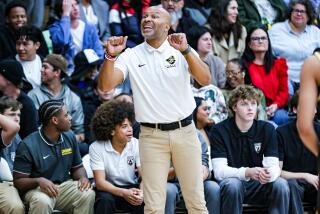When School Spirit Turns Mean, It’s Time for a Timeout
- Share via
“I’m looking for an advocate,” Foothill High Coach Tom Meiss said on the phone Friday afternoon. “I’m getting beat up on this thing.”
I initiated the call to Meiss, but when a high school football coach is willing to talk about something three hours before a football game--other than that night’s game--you know it’s weighing heavily on his mind.
So we talked and, whether or not I’m the advocate Meiss needs, it’s obvious to me he should not be getting beaten up. He should be heard out.
Meiss has been coaching for 30 years. As such, he understands the nature of sports rivalries as much as anyone else. Football rivalries add immeasurably to the drama of sports in America, from high school Friday nights to NFL Sunday afternoons.
But if nothing else, Meiss’ lifelong dedication to coaching entitles him to ask: When is a high school rivalry not worth it?
He’s concerned about the annual rivalry between Tustin High and Foothill High, both in the Tustin Unified School District. Meiss worries that the annual game has degenerated from a friendly cross-town rivalry to an uglier spectacle that needlessly pits fans and school district personnel against each other.
“I’ve been coaching for 30 years,” Meiss says, “and I’ve seen the good side and the bad side, and I know that our society has evolved to a point where it’s win at all costs and it’s evolved to where if you finish second or if you play well but don’t win, it doesn’t mean anything.”
Meiss has credibility because his Foothill team has won the last two games, including this year’s contest, 24-18. But winning the game may not be worth it, Meiss says, because of the attitude he perceives within the district.
Adding to the complicated cross-town mix, he says, is that Foothill is seen as the school “up here on the hill” and subject to the potshots from those who want to knock off the big school.
Meiss doesn’t like that spin on what should be a friendly, if spirited, rivalry. But when the news got out that Meiss was having second thoughts about the annual game, he got blitzed, he says.
“They haven’t heard my rationale,” he says. “Whatever the game, but especially at the high school and college level, when people can’t enjoy the competition, when it gets to that level, it definitely needs to have another look. That doesn’t mean we can’t play the game occasionally, but we don’t have to pound it into the ground year after year.”
Meiss says he had the same philosophy when he coached at Santa Ana High School--namely, that he opposed playing schools within the same district. Such games can lead to virtual “civil war” within a district and aren’t consistent with his message to his players that the games are meant to be fun.
“I’m trying to bring them along to the point where they can accept both winning and losing without having to live with it for the whole year, and without people throwing it up in their face,” he says. “I think that’s been one-sided. When we [Foothill] won, the talk has died down and gone away because people say we’re supposed to win. When Foothill lost, you had everyone from the custodian to the district administration reminding you every time you turned the corner, ‘You lost.’ You should be able to shake off a defeat and move on.”
One reason I’m airing Meiss’ feelings is that they match almost identically things I’ve said to friends in recent years about the rivalry between my alma mater, the University of Nebraska, and the University of Colorado.
The schools have been spiteful rivals for as long as I can remember, but the game has taken on an uglier tone in recent years. Nebraska dominated the series for years, but in the early 1980s the new Colorado coach publicly designated the game as his team’s most important and began an “anti-red” campaign in Colorado to rally support against the Big Red of Nebraska.
It could have been done in fun, but it had the effect of stirring up hostile fan and press reaction to the game. Colorado knocked off the Huskers three times in a five-year period, but N.U. now has won three years in a row.
But for me, the damage was done. What once was a fun rivalry has turned into something less pleasant as the interstate name-calling has intensified.
I think that’s all Coach Meiss is warning about. In effect, he’s calling for a timeout to make sure everyone knows what they’re doing. He’s saying that rivalries can be good or they can be bad.
Hard as it is to believe, he’s saying some things matter more than the final score.
Dana Parsons’ column appears Wednesday, Friday and Sunday.
More to Read
Get our high school sports newsletter
Prep Rally is devoted to the SoCal high school sports experience, bringing you scores, stories and a behind-the-scenes look at what makes prep sports so popular.
You may occasionally receive promotional content from the Los Angeles Times.






